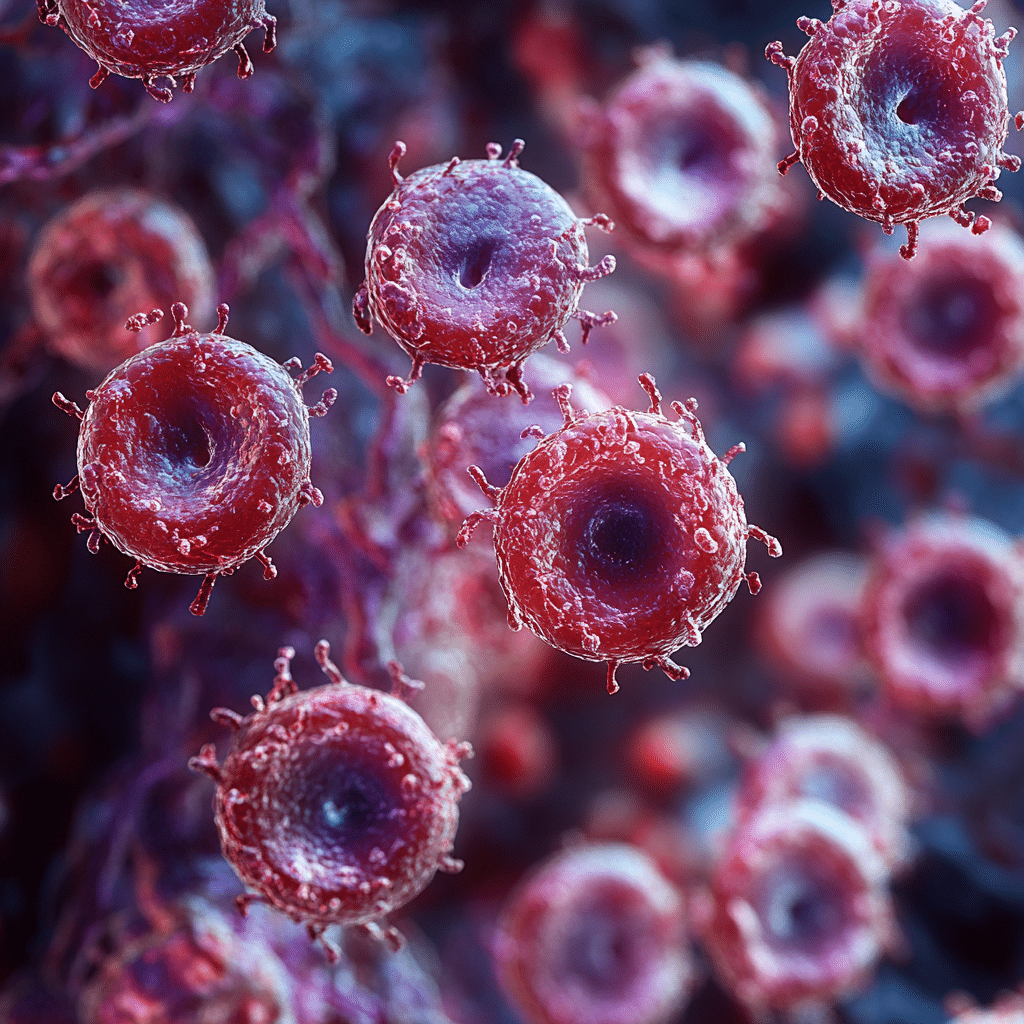Hey there, fitness warriors! You know we always aim for greatness, whether it’s getting shredded or building tons of muscle. But sometimes, our health can throw us a curveball we didn’t see coming. Today, we’re diving deep into a condition called macrocytosis, a fancy term for having larger-than-normal red blood cells. Let’s break this down into bite-sized chunks. Understanding macrocytosis can help you stay on top of your health game. It’s vital to know the symptoms, causes, and even how it might impact your fitness journey. So, let’s get into it, shall we?

1. Top 5 Symptoms of Macrocytosis You Need to Recognize
Macrocytosis might be sneaky—often not showing warning signs until a blood test reveals it. Here are the big five symptoms you really should keep an eye out for:
If you’re feeling like a zombie at the gym or dragging your feet while trying to smash that personal record, macrocytosis could be to blame. People often say they feel drained and like they’re pushing through molasses. Why? Because those oversized red blood cells aren’t as effective at transporting oxygen, leaving your muscles starved for air. You don’t want anything holding you back, especially when you’re on a mission to build those six-pack abs!
Ever catch a glimpse of your own reflection and think—you look a bit washed out? If your skin’s pale or if you’re seeing a yellowish tint in your skin or eyes (known as jaundice), it could be a signal of macrocytosis. This usually stems from issues with hemoglobin production. So, if you notice changes, pay attention!
Imagine you’re in the middle of a killer workout, and suddenly, your heart feels like it’s racing. Shortness of breath might also hit you out of nowhere. This happens because your body is in overdrive, trying to compensate for that reduced oxygen flow.
Many don’t realize that macrocytosis could mess with your mind and body coordination. A vitamin B12 deficiency often tags along with this condition, causing numbness, tingling, or even memory fog. You want your mind sharp when crushing your fitness goals, so don’t ignore these signs!
If you’ve been eating like a machine but still see your weight dropping or fluctuating, there’s a possibility macrocytosis is causing some nutrient absorption issues. Your body can struggle to get the key vitamins it needs, which can make it tougher to stay fit. Listen to your body—it’s telling you something!

2. Common Causes of Macrocytosis: What You Should Know
Knowing what causes macrocytosis is just as important as recognizing the symptoms. Here are some major culprits:
When it comes to macrocytosis, lack of vitamin B12 and folate tops the list. These vitamins are crucial for creating DNA in red blood cells. If you don’t get enough or if your body can’t absorb them (thanks to malabsorption issues), it can lead to macrocytic anemias.
Cheers to a night out, but frequent binge drinking can really mess with your nutrient levels. Alcohol can block your body from effectively absorbing vitamins, which isn’t great for your health. Some medications, especially cancer or HIV treatments, may also lead to macrocytic anemia, sidelining your workout routine before you even lace up!
If your thyroid isn’t working properly, it might overproduce larger red blood cells—hello, macrocytosis! Multiple studies have shown this connection, so ensure your thyroid health is on point if you’re noticing symptoms.
Conditions that affect bone marrow, such as myelodysplastic syndromes or aplastic anemia, can hinder your body’s ability to produce red blood cells the right way. This can lead to that nagging macrocytosis you want to avoid on your path to peak physical condition.
Macrocytosis can play tag with other blood conditions. Think anisocytosis (red blood cells of different sizes), agranulocytosis (low neutrophils), or thrombocytosis (high platelet count). Each can contribute to macrocytic anemia, making early detection vital for effective treatment!

3. The Role of RetiCulocytes: A Deeper Dive into Red Blood Cell Production
Let’s chat about reticulocytes—these are your body’s baby red blood cells. Their count can give healthcare providers crucial insights about macrocytosis.
If your reticulocyte count is high, it usually suggests your bone marrow is working hard to compensate for anemia. In cases like blood loss or hemolysis, this can make sense. If, however, your reticulocyte count is low while macrocytosis is present, that points to a production issue.
Your body’s response speaks volumes. So, understanding these counts can really help you in your health management journey. Being in tune with what’s happening inside can help you advocate for your overall well-being!

4. Diagnosing Macrocytosis: Key Tests and Evaluations
So, you’ve recognized some symptoms—what’s next? Here’s how folks typically get diagnosed with macrocytosis:
Innovative Wrap-Up: Navigating the Landscape of Macrocytosis
Arming yourself with knowledge about macrocytosis is key to taking charge of your health. The more you know, the better you can advocate for yourself! Early recognition of the symptoms and underlying causes can lead to effective management, ensuring you stay on track with your fitness goals.
Remember, champions—stay aware and proactive about your health! It’s all about maintaining healthy blood, which in turn can ensure a healthy life. So, take those steps to be the best version of yourself, whether it’s hitting the gym, preparing for a marathon, or just crushing life every day.
And hey, while you’re at it, you might want to check out the latest on Doja cat Grammys 2024 and see how pop culture can sometimes reflect our journeys too. Now, get out there, keep it real, and let’s make health an unstoppable force in our lives!
For anyone who’s intrigued about staying in the loop with fitness and health, make sure to explore our articles on high calcium Levels in blood and nicotine poisoning. You never know when that extra knowledge might come in handy! Now, lift heavy, eat healthy, and always stay educated on your body’s needs!

Fun Trivia and Interesting Facts About Macrocytosis
What’s in a Name?
Macrocytosis sounds complicated, but it simply refers to larger-than-normal red blood cells in your bloodstream. Interestingly, it can be a clue to several underlying health issues. For instance, folks with macrocytosis often deal with vitamin B12 or folate deficiencies. Quite a few people who have a specific blood type, like those with a b positive blood type, may need to be especially vigilant, as they could face additional health challenges linked with this condition.
Symptoms You Might Not Expect
When suffering from macrocytosis, symptoms can often be benign and subtle. However, did you know that larger red blood cells might affect your body’s oxygen supply? This can lead to feelings of fatigue. Fun fact—some people might even mistake this fatigue for just not getting enough sleep or skipping their morning coffee! If you’re experiencing unexplained symptoms like these, you might want to check for signs akin to leg clot Symptoms because they can sometimes overlap due to circulation issues.
Causes Galore
What causes macrocytosis, you ask? Well, various factors can play a role. One surprising cause can be the impact of certain medications, particularly those used for mental health. Just goes to show you, even something like a medication for mood can lead to unexpected changes in your blood! Another curious bit of trivia? A person’s lifestyle, including diet and hydration, can heavily influence their red blood cell production. Think about it—just like how a classic toy Tamagotchi needs proper care, so too does our body require a balanced intake of nutrients to maintain optimal health! And speaking of keeping track, folks are eager for news on the upcoming dream face reveal date of internet stars, perhaps to see how they maintain their health with all that online fame!
In a nutshell, understanding macrocytosis is key for anyone keen on maintaining their health. Whether it’s making sure you’re eating well or looking out for those sneaky symptoms, being informed can make a world of difference.



























